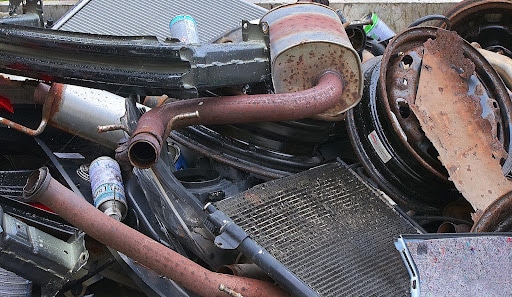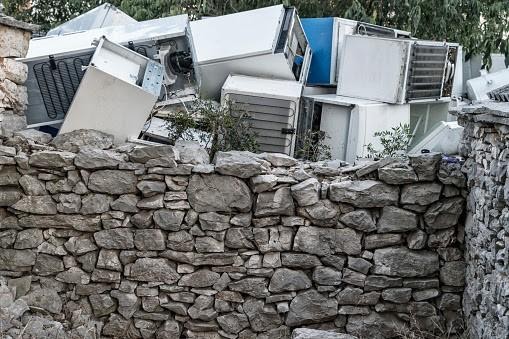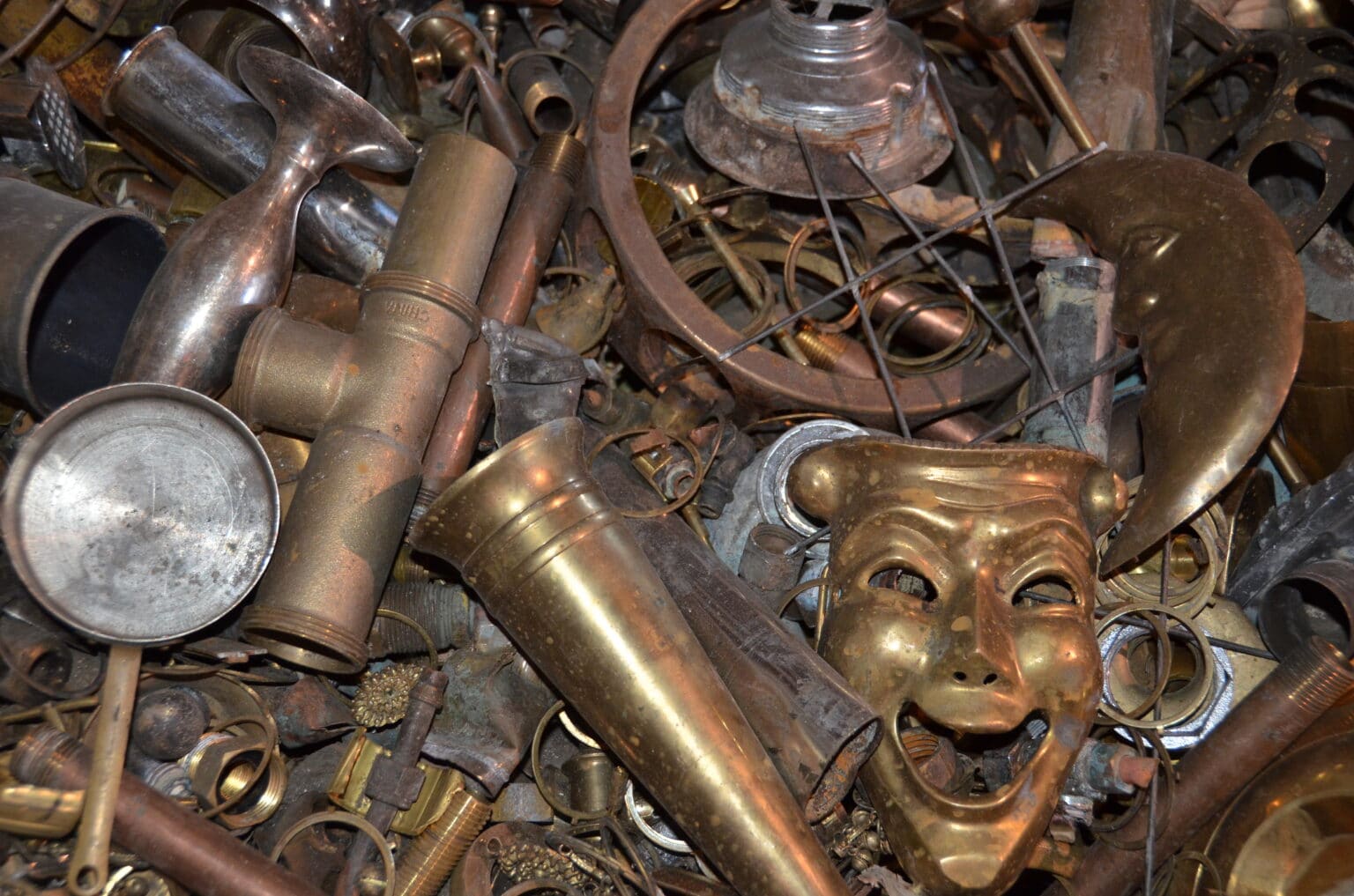Chances are, you already know that anything made out of metal can be recycled. But you may not realize that a surefire sign something has recyclable metal in it is when it uses a motor. That means everything from your old leaf blower to your broken desk fan.
If you’re confused about exactly how electric motor recycling works, don’t worry. This article will guide you through the four types of motorized objects that you can bring to the scrap yard.
What Are Motorized Items That Can Be Recycled?
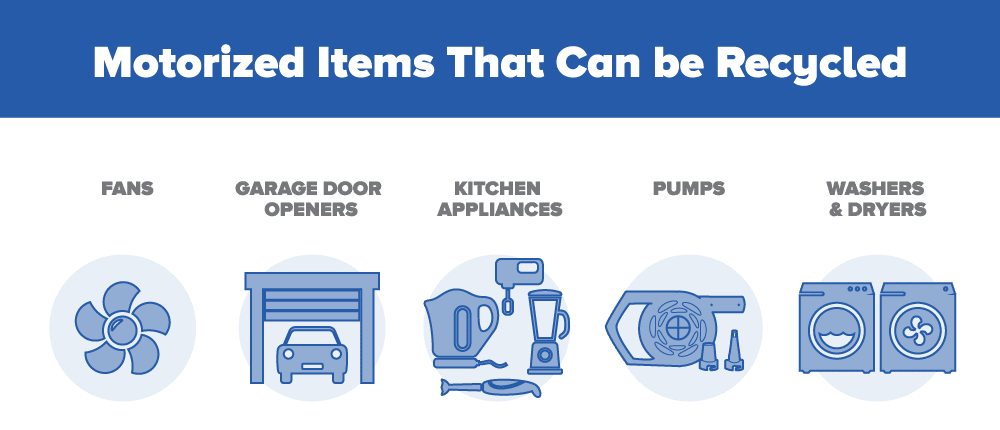
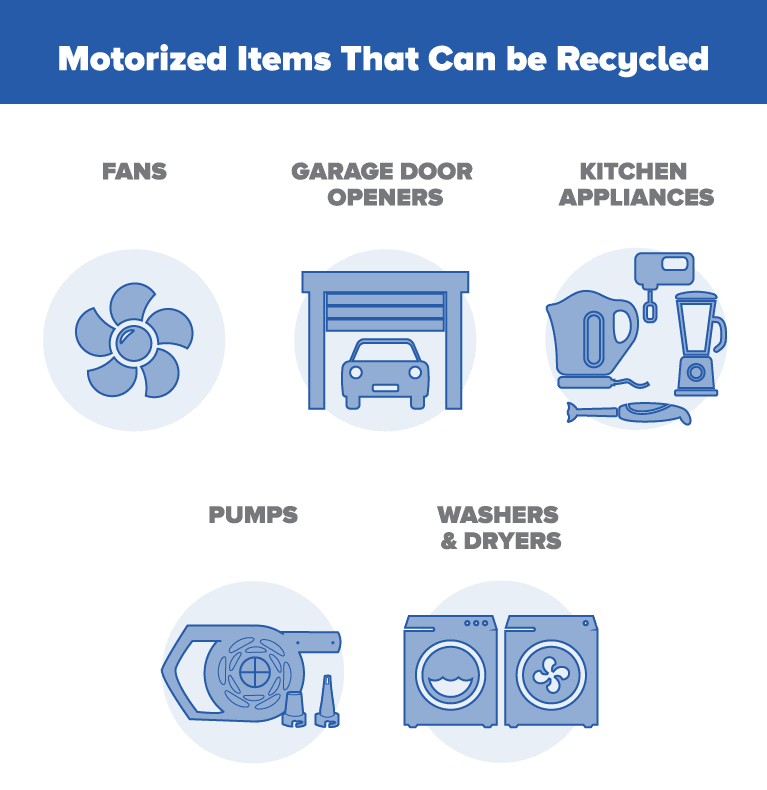
You can recycle any item that has a motor in it. The blades attached to the motor can be made out of plastic, or wood, or a different material. But the motor itself must be made out of metal. So, in a nutshell—If it spins, it’s using a motor that’s made of metal. But it’s easy to forget that many ordinary household items have motors, including things like ceiling fans, desk fans, oscillating fans, space heaters, leaf blowers, hair dryers… the list goes on and on. To simplify, we’ve put together a list of the five most common types of motorized objects that you can recycle.
1. Fans
This is a big category. Of course, there are the standalone fans we think of for cooling a space. Desk fans, standing fans, and ceiling fans can all be recycled when it’s time to replace them.
Other household objects use fans, too. Anything that blows or compresses air has a fan inside it. Your leaf blower, space heaters, and hair dryers all contain fans. Even your computer contains a fan — that’s what keeps the computer from overheating. You can recycle an entire computer tower, or just the fan if you’ve had to replace it.
Many of the small appliances in your home contain a fan and can be recycled.
2. Garage Door Openers
You’re probably using motor power to open and close your garage door every day. Just about any object that uses chains, wheels, and gears — like a garage door opener — operates with a motor.
That’s good news because it means that if your garage door opener breaks down and you can’t repair it, you don’t need to throw it away. You can recycle it – the entire unit, from the motor to the chains and tracks. Steel and aluminum garage doors can also be recycled.
3. Kitchen Appliances
The kitchen is the hub of recycling in many homes, where things like food packaging and newspaper are separated from other waste. You probably don’t think about them very often, but everything from the kitchen sink to many of your favorite cooking and cleaning tools are made of metal. Many of them are motorized, too.
Your garbage disposal, for example, works on a motor. A good, well-maintained garbage disposal will last for years, but when it stops working, you can remove it and take it to the scrap yard.
Almost all of the small appliances in your kitchen can also be recycled. Your stand mixers, blenders, and egg beaters all contain motors that can be recycled. In general, the rule is, if an object uses power and has parts that spin or vibrate, then it has a motor. And if it has a motor, you can recycle it.
4. Pumps
If you live in a house, you probably have at least one pump. Most of the pumps that we use today are motor-powered. An example of a hand-powered pump would be an air pump for inflating a basketball. But for any job bigger than blowing up a ball or a small inflatable raft, you’ll need an electric pump.
The small pumps that are used to circulate air in aquariums work on a motor and can be recycled. You can also recycle the pumps in certain medical devices.
You may have a sump pump on your property, to remove the water that collects around your home’s foundation. Depending on your home, you may also have a sewage pump or a well pump. Those pumps are all motorized. Typically, they are made to last for a good long time. But when they do break down, you can bring them into the scrap yard for recycling.
5. Washers, Dryers, and Dishwashers
Larger home appliances like washers, dryers, and dishwashers are all motorized.
Remember the rule: if it uses electricity and spins, it’s probably working on a motor. Your washer, dryer, and dishwasher also operate with moving belts and turning motor-powered wheels.
Large appliances are recyclable as whole units, but if you’ve had to replace or repair individual parts, chances are that you can scrap those too.
Should I Remove the Motor Before Recycling?
The short answer is, generally it’s not worth it. If you’re fairly handy and you’re used to working with electrical appliances, and you want to salvage the rest of the unit, then you can go ahead and take the motor out of your machines before recycling it.
However, if you’re not sure how to proceed, you should be cautious. Sometimes it can even be dangerous to try and dismantle an item on your own. Motors on many devices are not easy to get to, and you can say goodbye to any warranty once you start dismantling. Most of the time, it’s fine to leave the whole machine just the way it is. If you’re not sure, call the scrap yard ahead of time. The staff will be happy to explain the rules to you.
How Can I Recycle Electric Motors Near Me?
Cohen operates public and commercial scrap yards in Ohio and Kentucky. If you’re wondering, “Where can I find electric motor recycling near me?” use our website to see if Cohen has a location in your area, or search Earth911’s database of recycling solutions to find one near you. When you’re ready to get rid of your broken machines and appliances, don’t throw them away — recycle them.It

